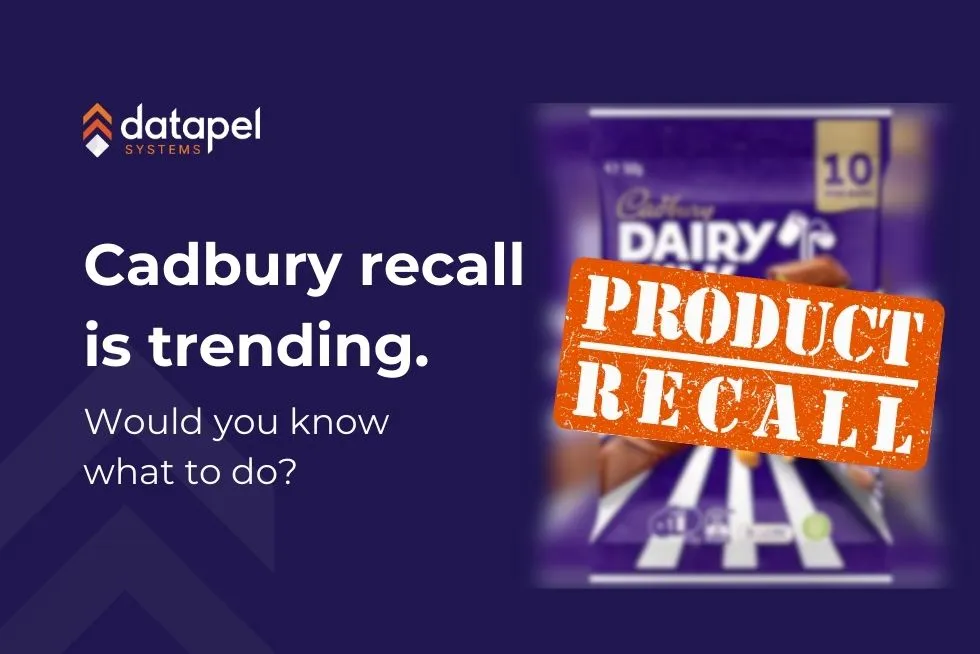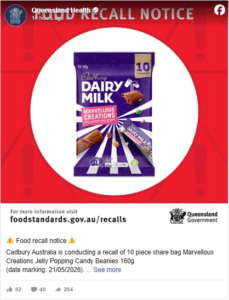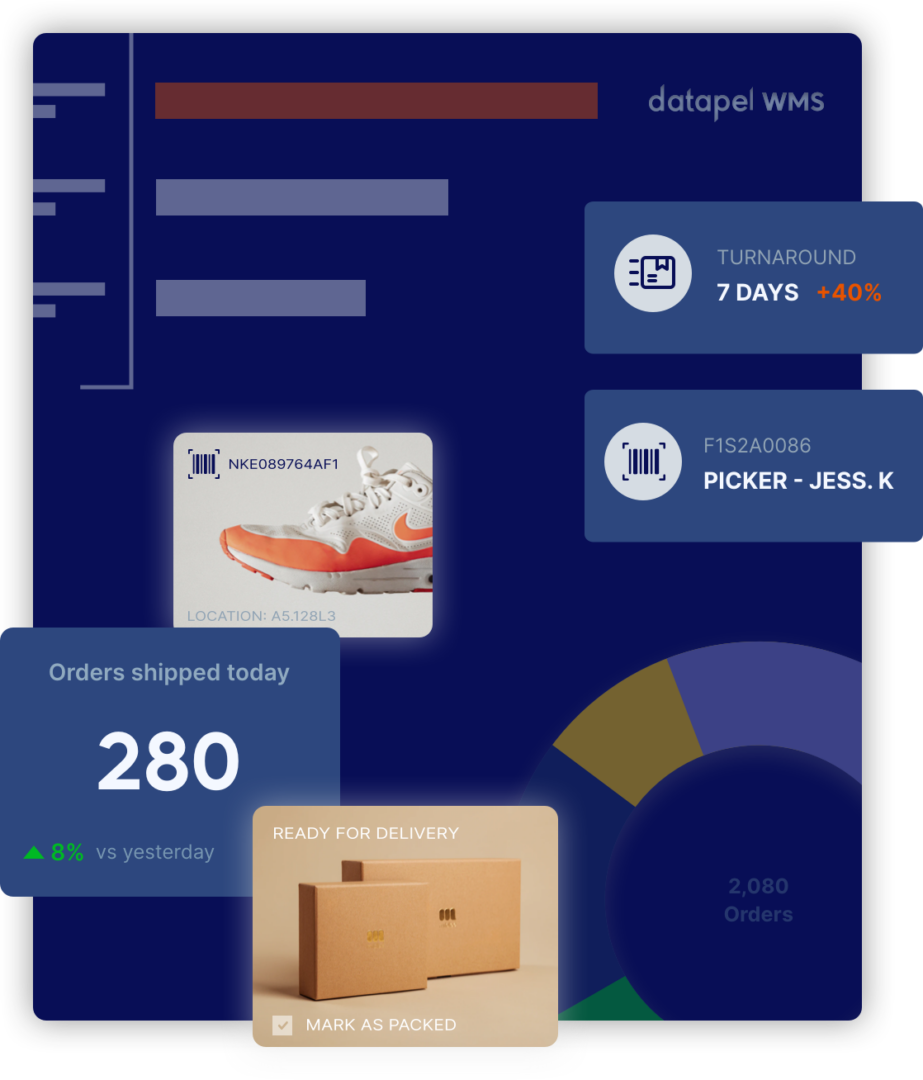What the Cadbury Recall Teaches Food & Beverage Businesses About Traceability
Contents
Cadbury’s recent chocolate recall in Australia, caused by potential plastic contamination in their Marvellous Creations Jelly Popping Candy Beanies, is making headlines (source: Economic Times). For consumers, it’s disappointing news. For business owners in the food and beverage sector, it serves as a stark reminder that product recalls can happen to anyone, no matter how big or established the brand.
Recalls like the Cadbury recall are high-pressure, high-stakes situations. Your ability to pinpoint affected products, quarantine them instantly, and alert the right customers determines how well you protect your brand, your compliance record, and public safety. This is where a Warehouse Management System (WMS) like Datapel can turn a recall from chaos into a controlled, traceable process.
Why Recalls Happen — and Why They’re Costly
A recall can be triggered by any issue that makes a product unsafe or non-compliant. Common causes include:
- Contamination during production, storage, or transport.
- Incorrect labelling, especially allergens that put consumers at risk.
- Expired or compromised stock slipping through checks.
- Supplier-related faults, such as faulty ingredients or packaging.
For food and beverage companies, recalls can have far-reaching consequences:
- Direct financial losses from unsellable stock and halted production lines.
- Regulatory penalties for failing to meet compliance standards.
- Reputational damage that impacts long-term sales.
- Loss of customer trust, which can take years to rebuild.
According to Food Standards Australia New Zealand (FSANZ), there are over 70 food recalls annually across the region. The financial cost for large companies can run into the millions.
The Cadbury Recall: A Real-World Stress Test
When a household name like Cadbury faces a recall, it proves that no amount of brand recognition shields you from operational risk. The recent Cadbury recall involved 160g share bags with a best-before date of May 21, 2026, sold at major retailers including Coles, Woolworths, Drakes, IGA, and The Reject Shop. Consumers were advised not to consume the products and to return them for a full refund, while those concerned about their health were told to seek medical advice.
High-profile recalls move fast:
- News outlets amplify the story within hours.
- Customers flood helplines and social media for answers.
- Regulators demand clear, immediate communication.
A slow or poorly executed recall can mean:
- Failing to reach every affected customer.
- Continuing to ship compromised products.
- Extending the media cycle and intensifying reputational damage.
Key takeaway: The Cadbury example shows that speed, accuracy, and traceability are non-negotiable.
Why Manual Processes Fall Short
If your recall process relies on spreadsheets, paper records, or disconnected systems, you’re already behind. Manual processes often result in:
- Delayed tracing of product movements.
- Missed batches or incorrect batch identification.
- Difficulty generating accurate customer lists.
- Lack of a centralised audit trail for regulators.
When a recall hits, you don’t have the luxury of hours — you need answers in minutes.
How Datapel Helps You Stay Recall-Ready
With more than 20 years in warehouse management technology, Datapel has worked with food and beverage businesses across Australia and New Zealand to improve operational control and recall resilience.
1. Instant Traceability
- Track products by batch, lot, or serial number from supplier to customer.
- Quickly identify every order containing affected stock.
- Trace back to the original supplier to pinpoint the source of the problem.
2. Quarantine Control
- Assign a “Quarantine” status to suspect stock with a single action.
- Prevent quarantined items from being picked or shipped.
- Use quality control flags to hold inventory until inspection is complete.
3. Rapid Customer Communication
- Filter sales history by SKU, lot, or serial to create targeted recall lists.
- Export data for email, SMS, or direct sales team contact.
- Ensure no affected customers are missed.
4. Regulatory Compliance and Proof
- Maintain a full movement history for all stock.
- Provide complete, accurate records to FSANZ or other regulators on demand.
- Demonstrate due diligence with ISO 27001–aligned data security.
Beyond Recalls: Everyday Benefits of Traceability
The same traceability tools that save a recall also improve daily operations:
- Expiry date management to reduce waste.
- Supplier performance tracking for quality control.
- Accurate stock forecasting based on movement history.
- Better retailer relationships through improved fulfilment accuracy.
With Datapel, you’re not just preparing for the worst — you’re improving operations for the long term.
Three Steps to Recall Readiness
If you want to be confident you could handle a recall tomorrow, focus on these three areas:
- Map Your Traceability Gaps
- Can you track every product batch from supplier to customer?
- Do you know where every unit is in real time?
- Can you track every product batch from supplier to customer?
- Automate Your Quarantine Process
- Make it simple to lock down stock in seconds.
- Ensure all team members know how to trigger a hold.
- Make it simple to lock down stock in seconds.
- Test Your Recall Workflow
- Run a mock recall to see how long it takes to pull customer lists.
- Check if your communication templates are ready to go.
- Run a mock recall to see how long it takes to pull customer lists.
The Takeaway for Food & Beverage Leaders
The Cadbury recall might be making headlines today, but next week it could be another brand — or yours.
The goal isn’t to avoid every problem (which is impossible), but to respond with speed, accuracy, and transparency when it matters most.
With Datapel, you can:
- ✅ Pinpoint the affected stock.
- ✅ Quarantine it instantly.
- ✅ Manage the recall with full compliance and peace of mind.
When every second counts, you need more than spreadsheets. You need a system built to keep you in control.

As a WMS Industry Analyst & Content Lead I write about warehouse management systems from real experience—helping businesses streamline operations, reduce errors, and scale smarter.
Over the past 8 years, I’ve worked closely with warehouse teams, tech developers, and business owners to break down complex supply chain problems into actionable solutions. My goal? Make WMS content useful, not just informative.
When I’m not writing, I’m digging into user feedback, testing new tools, or speaking with industry experts to stay ahead of what matters most to warehouse operators.








